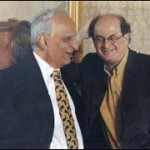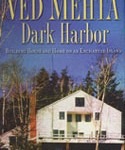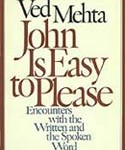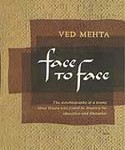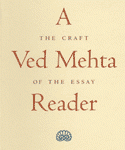Talent Knows No Borders
Born in Lahore in 1934, Ved Mehta has lived an itinerant life. The partition of India in 1947 forced him and his family to move to India. When he was a few months short of his fourth birthday, he lost his sight due to an attack of cerebrospinal meningitis. The doughty Mehta refused to be put down and persevered to bag an admission to a school for the blind in Arkansas. He was 15 years old then. In due course, with the help of many scholarships, he earned a double BA and an MA from Harvard. He started writing for The New Yorker as a student and eventually joined the magazine— working there for over three decades. At 23, he published his first book, an autobiography. He married late—at 49—and his wife, Linn Cary, is a descendant of James F. Cooper, the author of The Last of the Mohicans. Mehta, who will turn 71 next March, has just come out with The Red Letters, the final book in his autobiographical series. He met up with New York Chief of Bureau, Anil Padmanabhan, at his Manhattan residence. Excerpts:
Q. You conclude The Red Letterssaying that it changes the perspective that you set out in your first book on your father. Why is this so?
A. I published Daddyji, which was a biographical portrait of my father, in 1972. It was the first book in the Continents of Exile series. That book was a somewhat idealised picture of my father from a child’s perspective. It was factually correct but it didn’t have the psychologically dense perspective about my father, which I acquired in the process of this book.
Q. What is this final book about?
A. The Red Letters are love letters that my father received from a dalliance, as he called it, he had before I was born. My parents were happily married for 61 years. But during a posting in Shimla he started a brief relationship with an extraordinary woman. Perhaps the most beautiful woman in Punjab, she had certain attributes that as an “England-returned” doctor my father looked for in his partner, and my mother did not have. She had many other wonderful attributes. In fact, this book made me understand how remarkable my mother was. I don’t think I’d have written the book if I had not stumbled upon these letters and if I hadn’t found them quite as magical. Magical because of the peculiar, mysterious kind of language the woman uses—it is English but she might as well have written them in Hindi.
Q. In this book you seem amazingly objective. Especially since in India there is an issue of morality attributed to revelations about one’s father. You have also reserved judgement. How did you achieve this?
A. I have written over 20 books and if you read them you will understand that I’m a non-judgemental person. I was trained as a historian and I don’t think it is the job of a writer to be a prosecutor. There are certain Indian writers who belong to what I call the polemical tradition of literature but I believe that a writer should let the facts speak for themselves.
Q. In your book, you also seem to be providing a commentary on British India at that point of time. Is one reading too much into it?
A. No. It is a very perceptive comment. I don’t think my father would have got trapped into this relationship if he hadn’t been living in Shimla. I tried to recreate the kind of loose British-Indian society that was there. The whole atmosphere was that of a temporary place where people came just to spend their summer. It had a sort of intoxicating effect. I thought this could explain how the place had perhaps worked on him.
Q. The book is very descriptive. How did you capture that?
A. I think that if’ you live the way I do, you develop a sixth sense. And most of the stuff that you are referring to is historical reconstruction. It is no different than a historian describing Napoleon or Paris. It is true that I am perhaps the first person in my circumstances who has tried it.
Q. Describe your writing process. Do you maintain an audio journal?
A. I have never kept a journal. Actually, I’ve always had a good memory. I supposed I have had to rely on that after I went blind. I used tape recorders only when I was doing Mahatma Gandhi’s biography. I was afraid some of the disciples would deny what they had said to me. Ordinarily, even in interviews I never took notes. I underlined in my memory what I wanted to remember.
Q. How did it feel being an Indian when you first started out at The New Yorker—there were few people of Indian origin in the business?
A. Back when I wrote my first book, publishers hated anything with India as its theme. They said nothing about India would sell. But that was part of mv background and all writers write from their background. So I persisted. I wrote about India, but I also wrote about Christian theology, Oxford history and philosophy. I was always interested in doing different kinds of writing. I have a great dread of repeating a performance.
Q. How does your Indian identity play out now when all of a sudden India is the in thing in the US?
A. It has made no difference to my life. I’m not riding a certain fashion. I’ve always written what I wanted. But I’m happy India is getting more attention.
Q. What are your thoughts on the current generation of Indian writers?
A. I feel very paternal towards them; like an old banyan tree to new trees taking root. I like good writing—it can come from India or anywhere. Talent recognises no borders.
Q. You have been quoted as saying that “loss is the theme of my life”. Can you elaborate on that?
A. I meant loss of sight, of home and, with Partition, the loss of all the familiar landmarks of my childhood. The loss of language. I should ordinarily have written in Hindi, Punjabi or Urdu, but I ended up writing in what is really a foreign tongue. In the old days no one became a writer unless they became part of a national tradition. Now writers don’t belong to any tradition. That in itself is a kind of a loss.

